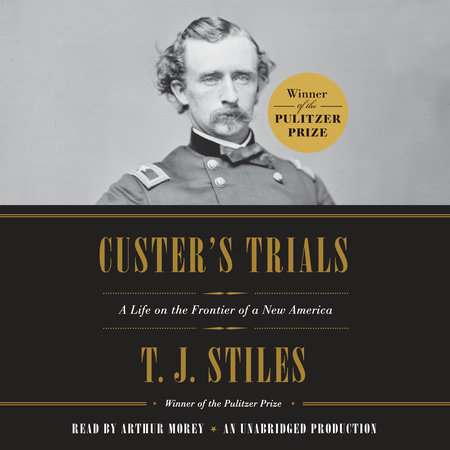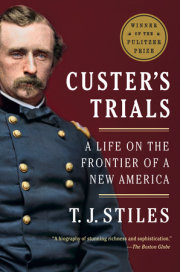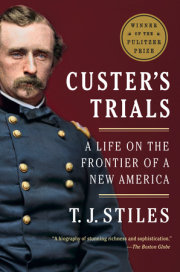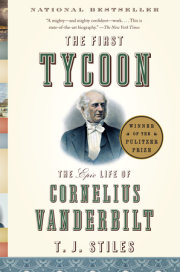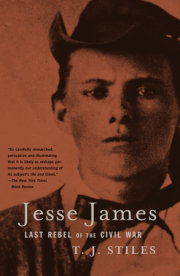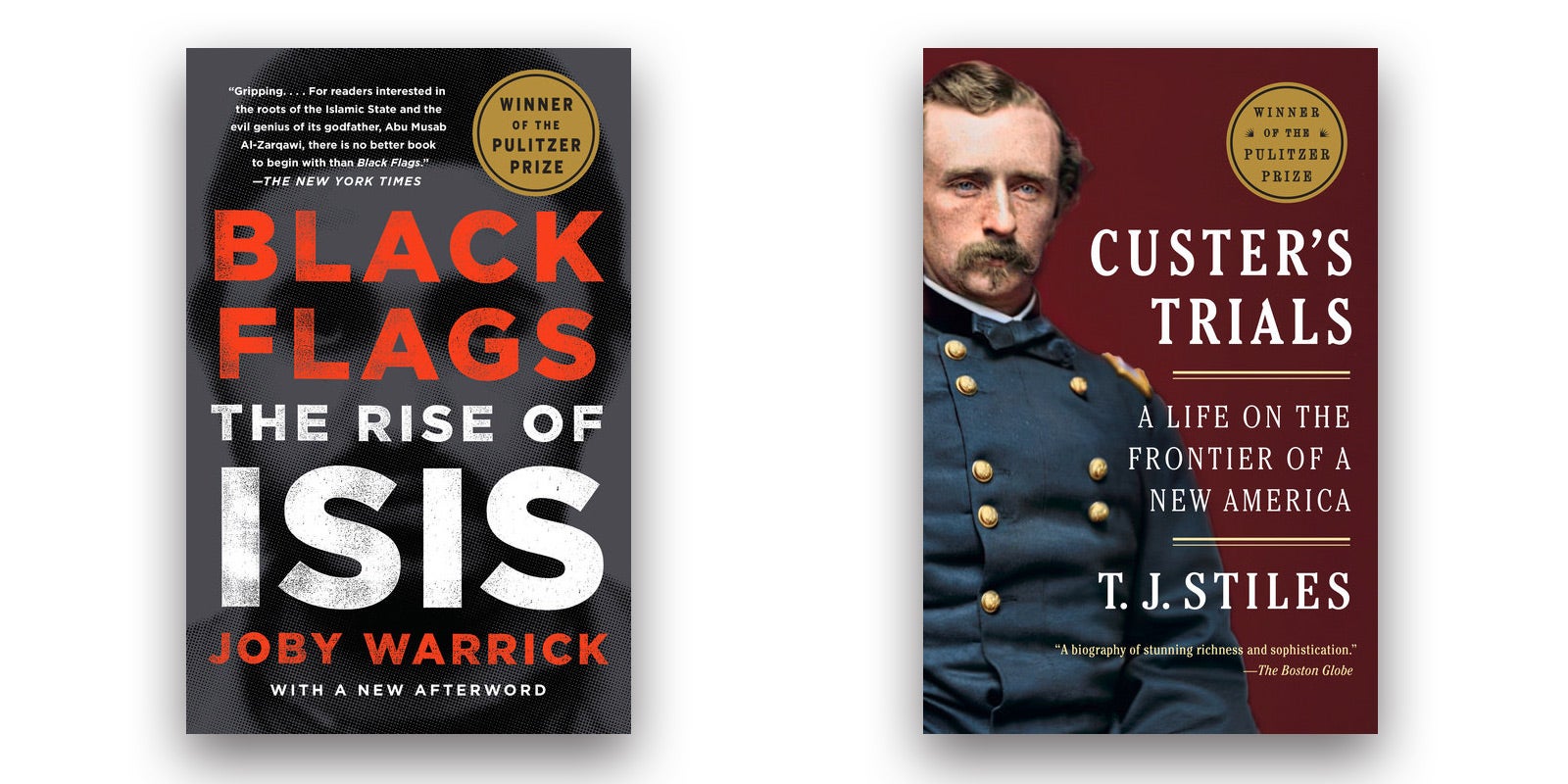A voice called out to Custer, telling him to come see the observation balloon. He stepped out of the large tent that he shared with three other officers and his dogs and looked up. It was aloft, floating over the Union encampment. He found his field glass in his hand, so he put its twin lenses to his eyes. He was stunned to see two young women from Monroe seated in the basket—women in whom he had a certain interest. He dropped his field glass and ran to the balloon’s base a short distance away. “Let me go up too,” he begged the men in charge of it. They agreed. In a moment he somehow reached the basket high above, “but my friends had gone, much to my disappointment.”
He awoke. Unusually, he remembered the dream. “I always deal with realities,” he wrote to his sister. “I am not a believer in dreams”—unlike his mother—“but on the contrary think it absurd to pay any attention to them.” The more he disavowed any significance, the more he implied that the dream haunted him. Two attractive young women appear in his most isolated post, a basket in the air; he suddenly, inexplicably, rises to that great height; they vanish the instant he reaches them. He corners what he desires, yet it escapes him, leaving him bewildered and alone.
When he stepped outside of his tent in the morning—awake, this time—he found himself at Harrison’s Landing, the James River bivouac where the Army of the Potomac had retreated after the victory at Malvern Hill. McClellan established his headquarters at Berkeley Plantation, virtually the birthplace of the slaveholding aristocracy in the South. Out of respect, McClellan did not occupy the brick manor house, but ordered tents erected on the grounds. There he brooded on his enemies in the administration.
Just after the Battle of Gaines’s Mill, McClellan had sent a remarkable telegram to Secretary Stanton. “If I save this Army now I tell you plainly that I owe no thanks to you or any other persons in Washington—you have done your best to sacrifice this Army.” He knew his accusation was shocking, but, he wrote to his wife, Lincoln was “entirely too smart to give my correspondence to the public—it would have ruined him & Stanton forever.” His delusion was not tested. In Washington the telegraph supervisor excised that last sentence, and so McClellan’s anger grew unchecked.
On July 8, in stifling heat and humidity, Lincoln came to Harrison’s Landing. McClellan and staff, including Custer, met his steamer at the pier and conducted him on a review of the army. Afterward the general and the president sat together under an awning on the deck of Lincoln’s vessel. McClellan handed the president a letter. Lincoln opened it and read as the general waited.
“I earnestly desire . . . to lay before your excellency, for your private consideration, my general views concerning the existing state of the rebellion,” McClellan wrote.
It should not be a war looking to the subjugation of the people of any State in any event. It should not be at all a war upon population, but against armed forces and political organizations. Neither confiscation of property, political executions of persons, territorial organization of States, or forcible abolition of slavery should be contemplated for a moment. . . . Military power should not be allowed to interfere with the relations of servitude, either by supporting or impairing the authority of the master.
He argued that the owners of contrabands should be compensated. And he backed his political lecture with an implicit threat: “A declaration of radical views, especially upon slavery, will rapidly disintegrate our present armies.”
Lincoln said nothing, a silence that McClellan took as vindication. The general even saw his defeat as a fine thing, reversing his earlier analysis. “God has helped me, or rather has helped my army & country,” he told his wife on July 10. “If I had succeeded in taking Richmond now the fanatics of the North might have been too powerful & reunion impossible.” He wrote to Samuel L. M. Barlow, the Democratic Party insider, “I have lost all regard & respect for the majority of the administration, & doubt the propriety of my brave men’s blood being spilled to further the designs of such a set of heartless villains.”
The self-absorbed general did not see the rising anger at his performance, in the North and even in his own army. Senator Zachariah Chandler of Michigan, an influential Radical on the Joint Committee on the Conduct of the War, wrote to his wife on July 6, “I can hold my temper no longer & will not try. . . . McLelland is an awful humbug & deserves to be shot.” McClellan airily wrote to Barlow, “I do not think it best to reply to the lies of such a fellow as Chandler—he is beneath my notice.”
McClellan also misread Lincoln. The recent setbacks had convinced the president that victory required farther-reaching policies. On July 13, he told two cabinet members, “We must free the slaves or be ourselves subdued. The slaves were undeniably an element of strength to those who had their service, and we must decide whether that element should be with us or against us.” But McClellan was blind to these shifts in politics—and blind to himself as well.
Custer was more complicated. In the weeks that followed Lincoln’s visit, he did two things that illustrated his inner contradictions—actions that were true to himself, yet pointed to two very different possible futures.
One of his deeds was to take part in a Confederate wedding. His old friend John “Gimlet” Lea had been paroled after the Battle of Williamsburg—allowed to go free as long as he did not return to military service before being formally exchanged. Prisoners on both sides obeyed the terms of paroles with remarkable faithfulness. Custer had heard that a family in Williamsburg was caring for his badly wounded friend, and McClellan gave permission to go to look for him.
Custer found Lea restored to health. Lea said that he was engaged to the daughter of his host—“very beautiful to say the least,” Custer wrote—and asked Custer to serve as best man. He agreed. During the wedding ceremony they stood together in uniform, one in blue and one in gray, opposite the bride and her attractive cousin Maggie. As Custer escorted Maggie out of the room, he told her she couldn’t be a very strong secessionist to agree to take the arm of a Union officer. “You ought to be in our army,” she said. “I asked her what she would give me if I would resign in the Northern army and join the Southern,” he wrote. She replied, “You are not in earnest, are you?”
He remained with Lea for two weeks, flirting with Maggie. The four spent each evening in the parlor, playing cards or listening to Maggie on the piano, playing “Dixie,” “For Southern Rights Hurrah,” and other rebel tunes. Custer did not mind; he was more interested in her beauty than her politics. In a sense, though, his very presence was political, in a way McClellan fully endorsed.
The other thing he did set a different tone, an implacable tone. “He vowed that he would not cut his hair until he entered Richmond,” Tully McCrea wrote to a friend. “You may think from this that he is a vain man, but he is not; it is nothing more than his penchant for oddity. . . . He is a gallant soldier.” He would let his curly blond hair grow and grow until the Union achieved total victory—a sign that he wanted total victory, a sign that became more visible with each day.
“Captain! Captain!” Custer heard the cry from the far side of some nearby bushes. It was the bugler, still just a boy. “Two secesh are after me!” Custer reined his horse around and found the lad firing his carbine at two Confederates approaching on horseback. Custer drew his revolver and spurred toward them.
It was August 5, 1862, on the Peninsula. Two days earlier he had crossed the James River on a raid with Col. William W. Averell, who commended him for his “impetuous dash.” Now he rode with Averell again in a probe of the rebels near White Oak Swamp. He and about 400 Union cavalrymen had charged a few dozen troopers of the 10th Virginia Cavalry, dispersing them. Custer had galloped off to the left after some escaping Confederates, away from the main body, when he heard the bugler.
Seeing Custer, the two rebels turned and fled. Custer rode one of them down; at his call to surrender, the Confederate hesitated, then reined in his horse and handed over his carbine. Custer took him back to the rest of his detachment and put him under guard, then rode out again, accompanied by a lieutenant and ten men. “We had not gone far until we saw an officer and fifteen or twenty men riding toward us with the intention of cutting their way through and joining their main body,” he wrote. “When they saw us coming toward them however, they wheeled suddenly to the left and attempted to gallop around us.”
Custer picked out the officer and spurred his fine black horse into a gallop. The rebel’s mount was at least as fast, so Custer angled to cut him off at a rail fence ahead. The Confederate jumped his horse cleanly over it. Custer followed, his own horse clearing the top rail. He had never felt such a surge of adrenaline—“exciting in the extreme,” he wrote. The enemy landed on soft ground, wet after a recent rain, which slowed his progress. Custer guided his horse to more solid footing and rapidly drew closer, hooves thudding the earth, freshly loaded revolver in hand.
Surrender, he yelled. Surrender or I will shoot. “He paid no attention,” Custer wrote. He fired and missed. “I again called on him to surrender, but received no reply.” He cocked his revolver—the six chambers in its cylinder hand--packed with lead balls, powder charges, and percussion caps—and leveled the barrel as he rode. “I took deliberate aim at his body and fired.” The hammer snapped down on the percussion cap, sparking the gunpowder, which exploded in a jet of flame and smoke, propelling the ball on a spiraling path through the rifled barrel until it burst out
of the muzzle. The other rider suddenly relaxed, sat upright in his saddle for an instant, and toppled heavily to the ground.
Now Custer’s strange sense of isolation, his temporary tunnel universe of only him and his prey, evaporated. His party appeared all around him, firing wildly at the rest of the escaping Confederates. The bugle call of “rally”—the command to return to the main force—warbled through the trees. Custer spotted a cluster of five riderless horses. He recognized a bright bay, a “blooded” thoroughbred. An exceptional straight steel sword swung from a black morocco saddle ornamented with silver nails and a red morocco breast strap. It was the horse of his victim, “a perfect beauty.” Custer took its rein and led it behind him. “A splendid trophy,” he wrote.
He did not see the man he had shot. The lieutenant who fought with Custer “told me that he saw him after he fell, and that he rose to his feet, turned around, threw up his hands and fell to the ground with a stream of blood gushing from his mouth.”
Again Averell commended Custer, for his “gallant and spirited conduct.” But this skirmish was unique. It was the first time he had killed a man—rather, that he knew he had killed a man. He had ridden in charges and ordered at least one himself; he had shot at the enemy and commanded that volleys be fired; but never had he selected an individual and destroyed his life. He had passed through a doorway with no return.
“It was his own fault,” he explained to his sister and brother-in-law. “I told him twice to surrender, but was compelled to shoot him.” He was answering a silent question—a question no one had asked but himself. Often he had expressed his willingness to die for his country; though not a devout man, his statements reflected the faith in which he had been raised, a religion that worshipped Him who had given His life that others may live. But Custer had never written about killing. It was a soldier’s defining function, of course, what set him apart from the civilian, even the constable, detective, or armed guard. Now he faced its reality.
The enemy soldier had been riding away, trying to escape. Custer tracked him, calculated his approach, and took careful aim. He shot him in the back. He had picked a man and erased his memories, canceled his hopes. He had wiped from existence his victim’s taste for his favorite food, his habit of how he wore his hat, his superstitions, his most secret fear, the way he laughed. He took the man from his parents and children and friends forever. I tried not to kill him, Custer told himself. I tried twice. And then I had no choice. Whether the answer satisfied him or not, he never asked the question again.
Copyright © 2015 by T. J. Stiles. All rights reserved. No part of this excerpt may be reproduced or reprinted without permission in writing from the publisher.

